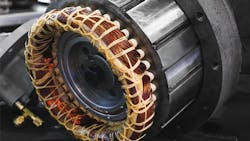AI built a better motor (but I still don’t trust it)
I’m not someone you’d describe as an “early adopter” of new technologies. I waited until 2010 to purchase my first smartphone, and I only made the switch after my beloved flip phone split in two. When I’m investigating new household appliances to purchase, I search for the devices that have the least number of smart features. I will never own an intelligent personal assistant like Amazon’s Alexa. I’m not a Luddite. I just prefer to let others take the initial risk, exposing their personal information, private conversations, and intimate thoughts to a cold, uncaring machine that, more than likely, will harvest and sell their information. It should come as no surprise that I have mixed feelings about the use of artificial intelligence. Yes, I’m fearful of how bad actors could utilize AI for nefarious reasons, but it’s hard to be skeptical when AI is enabling significant strides in the industry, like revolutionizing the creation of new materials.
Materials Nexus describes itself as a deep-tech company that employs AI to design new materials for net-zero technologies. While engineering new materials may sound like a fun way to reimagine the world, the reality is a lot less exciting. According to the company, the process has traditionally been slow, costly, and based primarily on trial and error. That’s why announcements of new materials are so few and far between. That tradition, however, may be changing with the help of AI.
Materials Nexus recently used its AI platform to create a new rare earth-free permanent magnet called MagNex. In a recent press release, Materials Nexus claims that its AI platform “identified and analyzed over 100 million compositions of rare earth-free permanent magnet candidates that address industry challenges.” Unlike rare earth element magnets, MagNex can be produced at 20% of the material cost and offers a 70% reduction in material carbon emissions. The most interesting part, however, is the creation time. While it took researchers decades to discover the standard permanent magnet we use in products today, MagNex took just three months to design, synthesize and test, which was accomplished with the help of the Henry Royce Institute and the University of Sheffield.
In a recent quote, Dr. Jonathan Bean, CEO of Materials Nexus, said, “AI-powered materials design will impact not only magnetics but also the entire field of materials science – we have now identified a scalable method for designing new materials for all kinds of industrial needs. Our platform has already attracted widespread interest for various products with applications that include semiconductors, catalysts, and coatings. I look forward to seeing the role it will play in supporting market demand for the creation of novel materials to help address increasingly pressing supply chain and environmental issues.”
MagNex could have a major impact on companies throughout the industrial sector. Rare earth magnets are an essential component of many industries, like electric vehicles, wind turbines, robotics, and drones, making demand for scare rare earth metals like neodymium and dysprosium on target to outpace supply. MagNex has the potential to alleviate this issue, and its quick AI-enabled creation offers hope for more and better materials in the future.
Iain Todd, Professor of Metallurgy and Materials Processing, University of Sheffield, recently said, “The combination of Materials Nexus’s approach of using AI for materials discovery and the world-class facilities we have for manufacture of advanced alloys in the Henry Royce Institute here at Sheffield has allowed a novel magnetic material to be developed with breathtaking speed. This achievement showcases the bright future of materials and manufacturing. The next generation of materials, unlocked through the power of AI, is highly promising for research, industry, and our planet.”
The Lighter Side of Manufacturing
Created by the editors of Plant Services and New Equipment Digest, The Lighter Side of Manufacturing is a feel-good blog that showcases how advances in science, math, engineering, and technology are making our world more whimsical. Here’s another post that is guaranteed to brighten your day.
Uncork the answer to better, greener footwear
ReCORK, a company that creates carbon-negative composite materials using natural recycled corks, is setting out to change the footwear industry.
About the Author
Alexis Gajewski
Senior Content Strategist
Alexis Gajewski has over 15 years of experience in the maintenance, reliability, operations, and manufacturing space. She joined Plant Services in 2008 and works to bring readers the news, insight, and information they need to make the right decisions for their plants. Alexis also authors “The Lighter Side of Manufacturing,” a blog that highlights the fun and innovative advances in the industrial sector.
